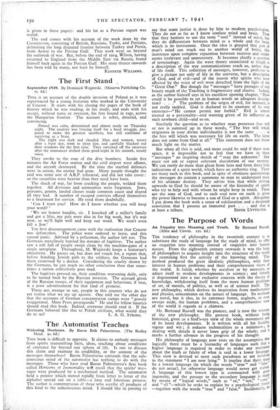The First Stand
THIS is an account of the double invasion of Poland as it was experienced by a young historian who worked in the University of Cracow. It starts with his closing the pages of the book of history which he was reading, in his study, and ends with his escape, without tunic or overcoat, his feet bound in rags, across the Hungarian frontier. The account is sober, detailed, and convincing.
Poland was calm, determined and almost ready on Thursday night. The country was bracing itself for a hard struggle, pre- pared to make the greatest sacrifices, but still confident of surviving as a State.
The night was dark and clouded. Men and women, weary after a busy day, went to sleep late, and carefully blacked out their windows for the first time. They switched off the receivers after the announcer wished them good-night in his smooth, steady voice.
They awoke to the roar of the dive bombers. Inside five minutes the Air Force station and the civil airport were aflame, and the aircraft destroyed. By the time the startled defences were in action, the enemy had gone. Many people thought the raid was some sort of A.R.P. rehearsal, and did not take cover : so the casualties were heavier than they need have been.
The shock of war, far from cracking the people, welded them together. All divisions and animosities were forgotten. Jews, peasants, gentry, landed classes made common cause and shared all they had. A number of escaped convicts offered themselves to a lieutenant for service. He eyed them doubtfully.
' Can I trust you? How do I know whether you will keep your word? '
' We are honest bandits, sir. I knocked off a miller's family and got a lifer, my pals were also in for big work, but it's war now, so we'll fight well and keep our word. We won't even kill a Jew.'
The first discouragement came with the realisation that Cracow was defenceless. The police were ordered to leave, and this caused panic. Advised by a policeman, the author left too. The Germans mercilessly harried the streams of fugitives. The author saw a raft full of people swept clean by the machine-guns of a single aeroplane. Throughout, M. Wegierski keeps a historian's objectivity. He passes on, but does not vouch for, a report that, before handing Jewish girls to the soldiers, the Germans had them examined by a doctor. Considering the cruelty shown by the Germans, he can reach no other conclusion than that some- times a nation collectively goes mad.
The fugitives pressed on, their condition worsening daily, only to be turned back by the Russian invasion. The account given of the Russian troops, of their equipment and behaviour, if true, is a poor advertisement for that land of promise.
There are, strange to say, people in this country who do not yet realise what we are up against. One told me the other day that the accounts of German concentration camps were " grossly exaggerated. Mere Press propaganda." He and his fellow lunatics should read this book. Indeed, everyone should read it. If the Germans behaved like this to Polish civilians, what would they






























 Previous page
Previous page